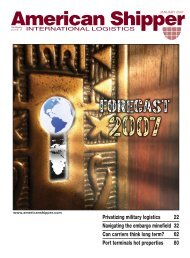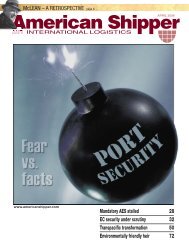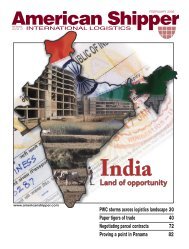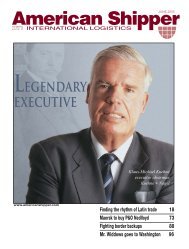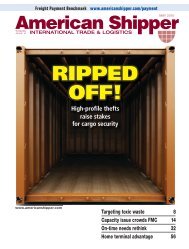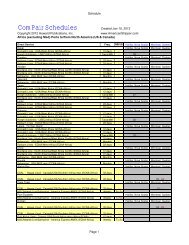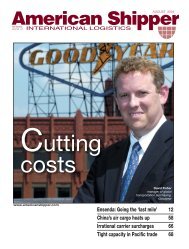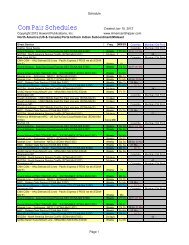Pirate Busters - American Shipper
Pirate Busters - American Shipper
Pirate Busters - American Shipper
Create successful ePaper yourself
Turn your PDF publications into a flip-book with our unique Google optimized e-Paper software.
Troubled<br />
waters<br />
Zim, CSAV and Hapag-Lloyd<br />
fight for their lives as shareholders<br />
double down on struggling lines.<br />
A<br />
group of shareholders of the parent company of<br />
embattled Israeli liner carrier Zim posited a simple<br />
theory to executives of the line in late August.<br />
The only reason Zim was in trouble right now, the shareholders<br />
said, was because of the ship-ordering binge it embarked<br />
upon in 2004. The context of this accusation was a meeting<br />
of Israel Corp.’s shareholders, where they were being asked to<br />
essentially provide the sandbags to Zim’s overflowing river.<br />
36 AMERICAN SHIPPER: OCTOBER 2009<br />
ANALYSIS BY ERIC JOHNSON<br />
The line has been leaking cash the past<br />
two years and sorely needs an injection of<br />
capital that will see it through the leanest<br />
period in the container shipping industry<br />
since the cargo box was invented.<br />
Zim is not alone. From Haifa to Valparaiso<br />
to Hamburg, some of the most<br />
famous names in ocean shipping are severely<br />
teetering.<br />
Chilean line CSAV has needed its own<br />
shareholders and ship charterers to provide<br />
some $700 million in relief, after first half<br />
losses hit $413 million.<br />
German carrier Hapag-Lloyd, meanwhile,<br />
has needed the financial backing of<br />
its two groups of major shareholders — a<br />
consortium of Hamburg businessmen who<br />
bought a 57 percent stake in the line in<br />
fall 2008, and tourism giant TUI, which<br />
formerly owned Hapag-Lloyd, but now<br />
has a 43 percent stake. The two groups<br />
have committed to inject $1.3 billion into<br />
the line in order to secure additional state<br />
backing from the German government<br />
worth $1.2 billion.<br />
What all these scenarios have in common<br />
is the swiftness with which multibilliondollar<br />
brands have been placed in peril,<br />
and the extent to which shareholders are<br />
being asked to retain faith in their business<br />
models.<br />
But back to the shareholders being asked<br />
to bolster Zim. Their statement — that the<br />
line’s own ambitious expansion problem<br />
was to blame — was quickly rebuffed by<br />
Zim, according to a report Aug. 20 in the<br />
Israeli business newspaper Globes.<br />
“The company would have been in crisis,<br />
irrespective of the procurement plan,” said<br />
Alon Raveh, Zim chief financial officer, in<br />
response to the shareholders’ worries. “The<br />
crisis is affecting all companies.”<br />
Much the same sentiment was put<br />
forward by Rainer Feuerhake, CFO of<br />
TUI, the 43-percent stakeholder in Hapag-<br />
Lloyd.<br />
“What we are doing with Hapag-Lloyd<br />
is safeguarding our investment,” he said.<br />
“There is a very serious situation. If we<br />
do not give them a very stable financial<br />
framework, Hapag-Lloyd could be in immediate<br />
danger.”<br />
Feuerhake was describing to industry<br />
analysts the reasons why Hapag-Lloyd’s<br />
shareholders were engrossed in make-orbreak<br />
talks about providing a cash infusion<br />
to the line.<br />
The words may have been different, but<br />
the message was the same: save us now,<br />
and you’ll thank us later.<br />
Or more precisely, late 2008 and the<br />
whole of 2009 is a historically bad passage<br />
of time for liner carriers and companies<br />
involved in this business deserve not to



